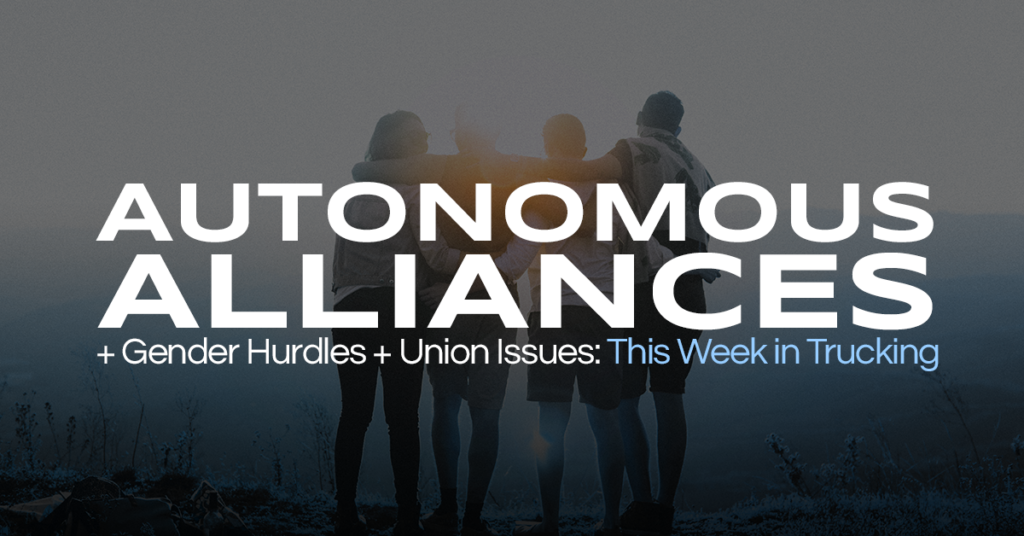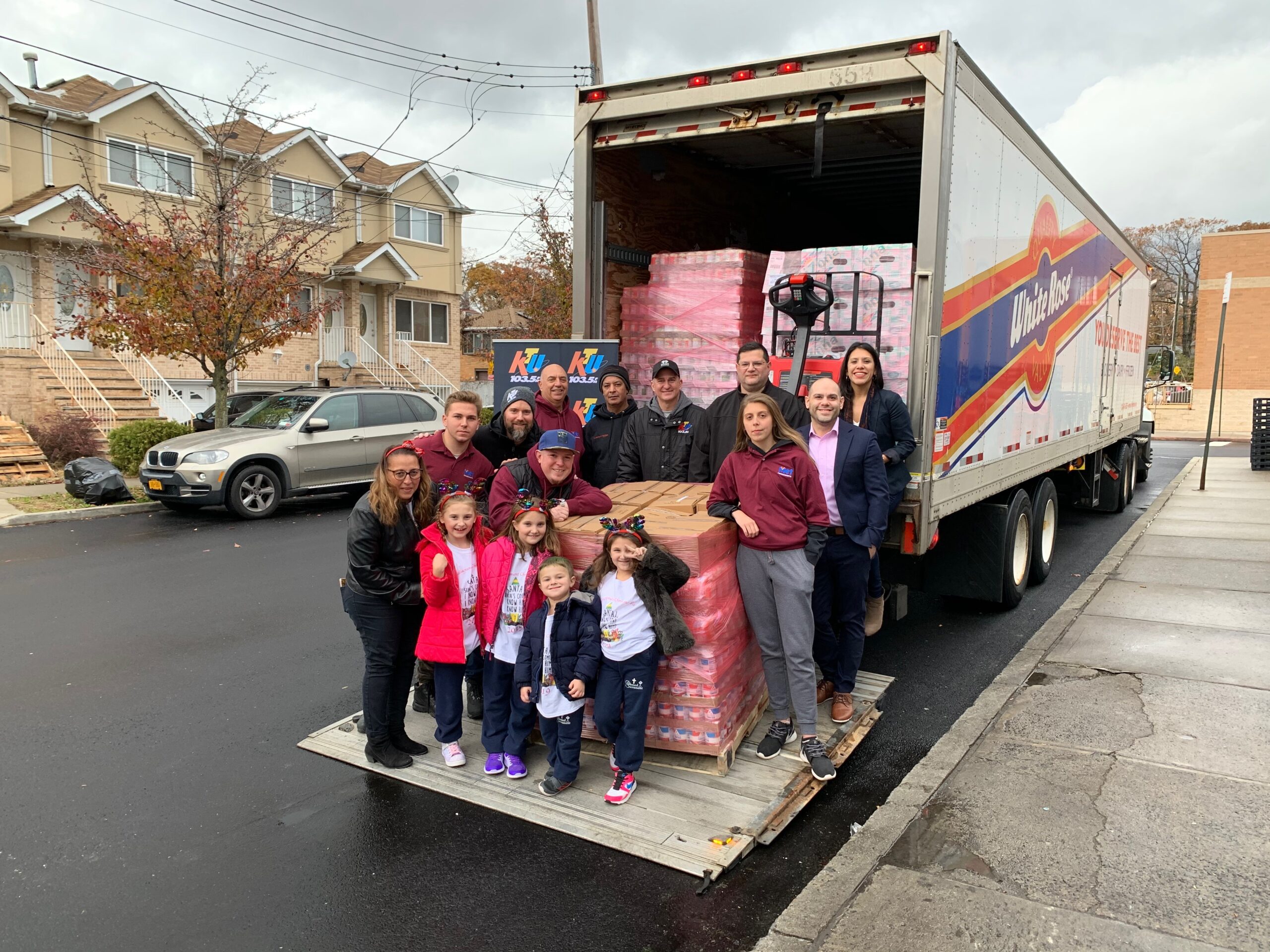
In the ever and rapidly evolving logistics landscape, emerging technologies and pressing industry challenges are shaping the future of trucking and transportation. As drivers, logistics professionals, and all other impacted industry personnel navigate these shifts, it’s essential to stay informed of the latest happenings. From groundbreaking alliances leveraging autonomous technologies to pressing social issues around gender and labor relations, the following is a quick and curated summary of some of the biggest headlines shaping the trucking world this week.
Maersk and Kodiak’s Autonomous Alliance
Maersk, a renowned global logistics titan, in collaboration with Kodiak Robotics, has recently embarked on a groundbreaking initiative: introducing a commercial autonomous trucking lane connecting Houston and Oklahoma City. Since August, the collaborative venture has utilized autonomous trucks that boast 53-foot trailers, with a designated safety driver poised at the helm. Impressively, these state-of-the-art vehicles operate ceaselessly, four days a week, covering both day and night, ensuring the timely transportation of consumer goods between pivotal facilities in Houston and distribution hubs in Oklahoma City.
Revolutionizing Logistics with AI Trucks
The inception of this collaboration stems from November when Maersk and Kodiak spearheaded their inaugural autonomous freight deliveries, aligning with Maersk’s Global Innovation Center Program. The overarching vision of this partnership is to seamlessly embed autonomous technology into the intricacies of the supply chain, fostering improved efficiency, safety, and overall performance in the logistics domain. Autonomous trucking, as the press release reveals, stands as a beacon of hope for the trucking industry, which currently grapples with a staggering driver deficit, anticipated to escalate drastically within the forthcoming decade. Moreover, the automation of trucking seeks to mitigate the overwhelming 94% of trucking mishaps attributed to human oversight. Kodiak’s autonomous trucks are not just sophisticated but also hyper-vigilant, equipped with 18 sensors and perpetually assessing over 1,000 safety-centric processes. With an ambitious gaze set on the horizon, both Maersk and Kodiak remain committed to delving into more innovative collaborations within Maersk’s rapidly burgeoning North American logistics nexus.
🔗 Read the full article on Maersk and Kodiak’s autonomous trucking venture here
Hitting the Brakes: Trucking’s Gender Roadblock
For years, the trucking sector has seen headlines regarding the driver shortage. However, many women assert that trucking companies have erected barriers that keep them from these driving roles. There’s an industry-wide practice that requires all female candidates be trained specifically by other women. The practice continues despite a 2014 federal court ruling that deemed same-sex training requirements unlawful. Ashli Streeter from Texas, after investing $7,000 in truck driving education, faced this particular roadblock when she was rejected by multiple carriers, including Stevens Transport, due to their lack of female trainers.
Legal Speed Bumps and the Road Ahead
In response to the same-sex training policy, Streeter, along with two other women, have gone forth and lodged an official complaint against Stevens Transport with the Equal Employment Opportunity Commission. Critics of these rules argue that while there is merit in the industry’s focus on preventing potential sexual harassment issues during mixed-gender training, it does so at the cost of equal employment opportunities for women. With women accounting for only 4.8% of the US trucking workforce, leaving a greatly untapped market, especially with trucking making headline offering competitive salaries that appeal to many women. The ongoing debate suggests a need for more inclusive training policies, coupled with effective harassment prevention measures. The broader question remains: How can the trucking industry evolve to be both safe and equitable for all aspiring drivers?
🔗 Dive deeper into the challenges faced by women in the trucking industry here
Yellow Freight’s Downfall and the Union Impact
In a shocking turn for the trucking industry, Nashville-based Yellow Freight, one of the largest trucking companies in the US, declared bankruptcy and ceased operations. This decision rendered over 30,000 individuals unemployed. Unlike most trucking firms, a significant portion of these job positions were unionized. Tracy Cullen, a long-time driver for Yellow, shared that tensions had escalated with the Teamsters union in the run-up to the company’s collapse. Lapses in health benefit payments and looming strike threats marked the final days. While the company was able to momentarily assuage the situation by paying up, it soon after announced its shutdown, attributing the Teamsters union as the root cause of its problems.
Job Struggles in a Right-to-Work State
Following Yellow’s closure, thousands of truck drivers, like Cullen, find themselves navigating the challenging job market. In states like Tennessee, which is among the 28 states with right-to-work laws, finding a union job can be especially daunting. These laws can dilute the power of unions, potentially hindering collective bargaining efforts. While the current trucking job landscape should theoretically favor drivers due to the prevalent driver shortage, ex-Yellow employees face unexpected hurdles. Some believe there’s an underlying hesitancy among companies to hire former union-affiliated drivers. Chris Dowdy, another former Yellow driver, recounts being blatantly denied opportunities because of his prior affiliation with Yellow. Though he eventually found a position with Kroger, many of his peers continue their job hunt.
🔗 Discover more about the challenges faced by former Yellow Freight drivers here
Before You Hit The Road…
The recent developments in the logistics and trucking sector emphasize the importance of adaptability, inclusiveness, and innovation. Whether it’s embracing autonomous trucking to bridge the gap of driver shortages or addressing gender disparities and labor relations in the industry, the path forward requires collaboration and forward-thinking.
As always, we invite our valued readers to share your thoughts and insights in the comments section below. What implications do these news stories have for the future of trucking? How can the industry tackle these challenges head-on? Your insights are invaluable. And don’t forget to join us next week for another edition of Optimum Logistic’s weekly news recap, where we aim to keep you updated with the pulse of the industry. Safe travels and stay informed!
If you made it to this part of the article, we’d just like to take a moment to thank you for taking the time to read this weekly recap. Be safe out there and as always, If you’re in search of CDL A, B, or warehouse positions, check out our open positions. And if you need staffing solutions for commercial driving or industrial positions, be sure to explore our offerings.



